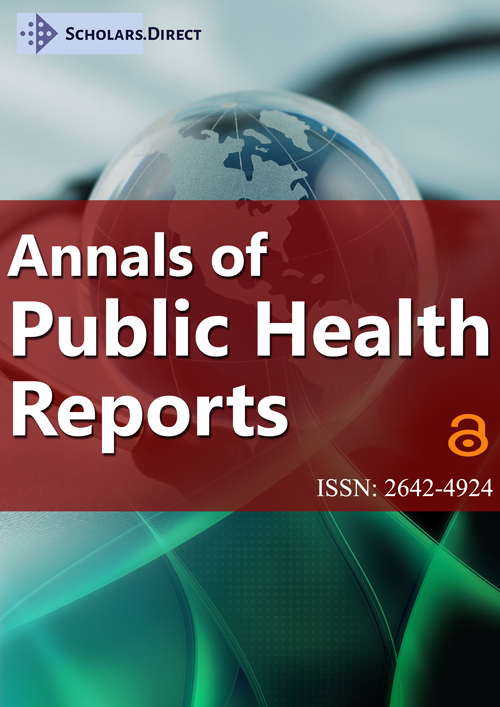COVID-19 and Individuals with Learning Disabilities
Abstract
A lot has been written about the larger portion of the human population who can understand the implication and impact of the ongoing COVID-19 pandemic and adjust to regulations for self-protection. We hope to bring the challenges of care for individuals with learning difficulties during this ongoing pandemic to the fore and how to maximize care and protection for them.
Introduction
The world is still grappling with the impact of the new COVID-19 viral infection, which has proven to be highly infectious (achieving a pandemic status) and causing significant morbidities and mortality, especially among identifiable vulnerable groups. Hundreds of thousands of lives have already been claimed in mortality from this viral infection worldwide. Definitive modalities for treatment are still yet to be fully understood [1].
The World Health Organization estimated that 15% of the world's population live with a disability and about 110-170 million adults have significant functional disabilities. It also reckoned that these individuals often have trouble accessing healthcare and potentially having unmet healthcare needs [2]. There are about a million and a half persons in the United Kingdom who have a learning disability, and out of this number, about 350,000 have severe forms of learning disability [3].
Individuals with learning disabilities have varying challenges with receiving, processing, or responding to environmental and human stimuli. They would have mild, moderate, severe, or profound challenges with learning new skills and coping independently [3]. They will remain at the risk of contracting the virus from their environment or other human hosts.
As of the 23rd June 2020, of the total numbers of deaths from COVID-19 infection reported in the United Kingdom (28,434), 590 persons with autism or learning disabilities were verified to have had COVID-19-related deaths [4]. It remains to be described what the figures are with many other countries when describing the impact of the COVID-19 pandemic on individuals with learning disabilities.
Decisions about consent (and participation in clinical trials) and ceiling of care are some out of the many ethical questions that have been stated in the care of these individuals who contracted the COVID-19 virus. Another perspective raised from the care of learning disability patients with COVID-19 infections includes defining what makes for a hospital or home care during a pandemic for a potentially lethal infection [5]. The limitations of service provision for patients with learning disabilities at family homes or nursing homes during a pandemic with restricted movement of the workforce and shut down of support community services or programs have been reported [6].
The immunity levels of individuals with a severe or profound learning disability who are bedbound and requiring continuous care by another could be considered as impaired. Definitive shielding protocols to prevent COVID-19 transmission to them should be put in place [7]. Government regulations to cover the unique needs of people with learning disabilities in the ongoing pandemic may need to be further explored and protective moves publicized.
The National Health Service, listed persons with a learning disability as being of moderate vulnerability to getting the COVID-19 infection. Individuals with learning disabilities could fall under the category of extremely vulnerable group based on their care needs and medical status. Unique assessments for them to protect them during this pandemic and beyond will need to be done [8].
About this COVID-19 virus, there is still the threat of spread in communities as well as spread in healthcare places [9]. Patients and relatives are mostly being advised to stay off hospitals or healthcare places unless needed. The potential risk of intra-hospital COVID-19 spread remains a reality. Hence learning disability patients' need for hospital services should be clearly and expressly thought out by all concerned on an individual basis and addressed. Treatment needs of learning disability patients who become COVID-19 virus-infected should have an early review, and the place of multi-disciplinary communication with families or next-of-kins, learning disability teams and their care homes cannot be over-emphasized.
Key Points
- Individuals with learning disabilities stand a risk of partial knowledge or not fully grasping the implication of the ongoing COVID-19 pandemic enough to protect themselves.
- Government regulations to all-and-sundry to ensure their ongoing protection against the COVID-19 infection and ensure their welfare in the face of restricted services from lockdown measures to control the virus spread.
- Healthcare needs of this special group should be well-thought out or anticipated and where an individual with learning disability gets infected with this virus, multidisciplinary care and communication will be paramount.
Conflict of Interest
The authors declare that they have no conflict of interest.
Funding Source
None.
References
- Stawicki SP, Jeanmonod R, Miller AC, et al. (2020) The 2019-2020 novel coronavirus (severe acute respiratory syndrome coronavirus 2) pandemic: A joint American College of Academic International Medicine-world academic council of emergency medicine multidisciplinary COVID-19 working group consensus paper. J Global Infect Dis 12: 47-93.
- WHO (2021) Disability and health.
- NHS (2020) Learning disabilities.
- NHS (2020) COVID-19 deaths of patients with a learning disability notified to LeDeR.
- Gulati G, Fistein E, Dunne CP, et al. (2021) People with intellectual disabilities and the COVID-19 pandemic. Ir J Psychol Med 38: 158-159.
- Erin D (2020) COVID-19 pandemic presents new challenges for learning disability nurses. Learning Disability Practice.
- SCIE (2020) COVID-19 guide for care staff supporting adults with learning disabilities or autistic adults.
- NHS (2020) Who's at higher risk from coronavirus.
- Gareth I (2020) Covid-19: Doctors sound alarm over hospital transmissions. BMJ 369: m2013.
Corresponding Author
Dr. Alamin Alkundi, William Harvey Hospital, Ashford, Kent, TN24 0LZ, United Kingdom.
Copyright
© 2021 Momoh R, et al. This is an open-access article distributed under the terms of the Creative Commons Attribution License, which permits unrestricted use, distribution, and reproduction in any medium, provided the original author and source are credited.




